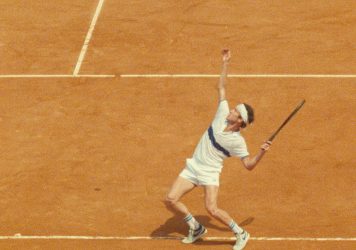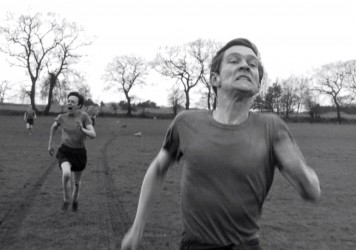This riveting sports documentary tells the stranger-than-fiction story of the famed Japanese women’s volleyball team.
In an era when only amateur athletes could compete at the Olympics, the Japanese women’s volleyball team of the Nichibo Kaizuka Textiles Factory worked their way to a jaw-dropping undefeated streak of 258 games, picking up the (poorly aged) nickname ‘Oriental Witches’ after demolishing the competition in their journey to the world championships in Europe.
The name eventually became a point of pride for the athletes as they enjoyed the idea of their having special powers and mystique. In The Witches of the Orient, director Julien Faraut emphasises the effort that brought them glory, dismantling any notion that their skill was as though by magic.
Based on interviews with surviving team members (spiker Emiko Miyamoto is absent, Sata Isobe and their captain Masae Kasai have since passed), the film captures the team in a less formal setting at a reunion lunch. Viewed through steady observation from Yutaka Yamazaki, the women describe in their own words the difficulty of being part of the team: their sororal bonds; the pressure from the government. The interviews further highlight the physical realities behind their superhuman reputation, with details of injuries or training drills over footage of one player repeating receives until they collapse.
The astonishing footage is rhythmically edited to the point that its repetitiveness becomes hypnotic. Some of the most captivating moments come from the interplay between newsreels of factory work and the monotonous training drills, propelled by French artist K-Raw’s musical score; the sequence highlights the corporate connection between their work and their sport, even as textiles work became less of a focus of their daily lives.
A similar sequence montage details the exhaustive, almost torturous training drills of the teams coach Daimatsu, known by some as ‘The Demon’, scored (perhaps a little melodramatically) to Portishead’s ‘Machine Gun’. It’s also a visually striking sequence, though perhaps undermines its own line of questioning when it culminates with a series of quotes of the players shrugging off the brutality of it in the present.
Their domination of the sport shaped popular culture in Japan, something Faraut notes with a brief acknowledgement of the boom of manga and anime around women’s volleyball after the team’s historic run, starting with their portrayal in the ’60s series Attack No.1. The show and its imitators all highlighted the harshness of training and the need for a unique move (“the rolling receive – Japan’s secret weapon”), tropes that any fans of modern sports anime like Haikyu!! will instantly recognise.
As well as conveying the team’s legacy, interspersing clips from Attack No.1 throughout the film is also simply a delightful touch, contrasting the sometimes absurd physics of sports anime with a world championship game, the exaggerated sound effects conjured by the women’s actual movements.
All these stylistic flourishes dovetail with the portrayal of the volleyball final at the 1964 Tokyo Olympics. In a moment that really does feel like witchcraft, the intimate 4:4 framing adopted by the film up to this point suddenly breaks free of those confines. Those who have watched Kon Ichikawa’s Tokyo Olympiad might recognise the bout, though Faraut ups the pace of proceedings where Ichikawa slowed them down. His subjective editing again creates an atmosphere of ferocity, rather than a simple journalistic retelling of the event.
The Witches of the Orient at once characterises and deconstructs the mystique of the team’s eponymous nickname. Not unlike Tokyo Olympiad, it matches an impressionistic vision of athleticism with a humanist interest in the athletes themselves, showing the emotional and physical cost of sporting glory.
Published 14 Jul 2021
Volleyball is secretly the coolest sport, and this looks to be an interesting visual twist on the sports doc.
Rhythmic, palpably exciting stuff.
Faraut’s editing is astounding in how it reinforces the team’s cultural legacy, and the intensity of the athleticism that built it.

The combustible American tennis star is picked to pieces in this mischievous French essay film.

This powerful documentary charts the history of the Paralympics and its positive impact on disability representation.

The Loneliness of the Long Distance Runner underlines the importance of competing on your own terms.